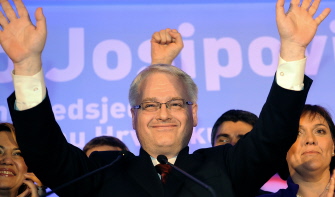Croatia elects anti-corruption prez
ZAGREB: Opposition Social Democrat Ivo Josipovic won Croatia's presidential election by a wide margin Monday after pledging a crack down on corruption, and vowed to transform the nation into a "star" of Europe.
The law professor and classical music composer took 60.26 percent of the votes in Sunday's run-off, according to final results.
"I want a European Croatia, a Croatia that will be one of the shining stars in the European sky," the 52-year-old told his supporters early Monday as his victory became clear.
This would be "not only through EU membership but by values that we stand for -- democracy, freedom, human rights, rule of law, minority rights (and) religious freedom," he said.
Josipovic, due to be sworn into office on February 18, will lead Croatia's efforts to join the European Union. Zagreb is aiming for EU membership by January 2012.
He ran on a ticket of rooting out corruption, one of the conditions for EU entry, and beat his rival, populist Zagreb mayor Milan Bandic, by a wider-than-expected margin.
Monday papers and analysts hailed Josipovic's victory as a new era for the former Yugoslav republic, in which it would leave behind the 1990s Balkan wars.
"The historic mission of Ivo Josipovic as the head of state has been already determined: to lead Croatia after some 20 years (since independence) into a new integration -- the EU," the Novi List independent daily said.
"The country born in war should eventually transform into a peacetime, civilised, European country," it said, referring to the 1991-1995 war for independence from the former Yugoslavia.
Political analyst Zarko Puhovski told AFP that Josipovic, who has an untarnished political career, was up to the task.
He "will be able to get along with leaders of the countries in the region and the EU, and represent Croatia's interests in a competent way," Puhovski said.
The influential Jutarnji List daily said Josipovic's victory showed that Croatians wanted a new type of politician.
"While the 1990s symbolise corruption, Josipovic's programme 'Justice for Croatia' should symbolise better times for the country," columnist Davor Butkovic said.
Croatian authorities have in recent months launched several investigations into alleged graft at state-run firms, seen as rife with corruption, with more than a dozen officials already detained.
Josipovic is Croatia's third president since independence and succeeds Stipe Mesic, who steps down on February 18 after serving a maximum two five-year terms.
Mesic, 75, helped transform Croatia into a parliamentary democracy after being an isolated autocracy, the legacy of Franjo Tudjman who led the country with an iron fist through the 1991-1995 war until his death in 1999.
The outgoing president hailed his successor's triumph, saying that a "democratic, European Croatia, and values of Europe to which we are aspiring have won".
Voter turnout on Sunday was 50.13 percent, officials said, with the electorate apparently weary of recent political scandals and pre-occupied by Croatia's deepening recession.
Josipovic has also promised economic improvements, with Croatia's economy predicted to have contracted up to 6.0 percent in 2009.
Observers say, however, that the president's powers are limited with the day-to-day running of Croatia largely in the hands of a conservative government led by Prime Minister Jadranka Kosor.






